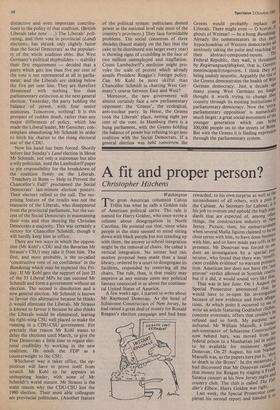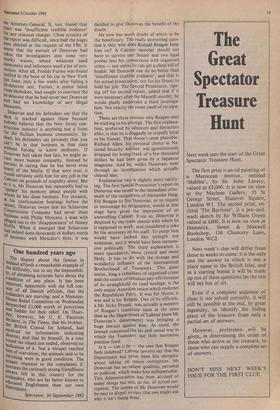A fit and proper person?
Christopher Hitchens
Washington rr he great American columnist Calvin 1 Trillin has what he calls a Golden rule of American political satire. The rule is named for Harry Golden, who once wrote a column about desegregation in North Carolina. He pointed out that,• since white people in the state seemed to mind sitting down with black people but not standing up with them, the answer to school integration might be the removal of chairs. He called it vertical integration. No sooner had this modest proposal been made than a local library, ordered by a court to desegregate its facilities, responded by removing all the chairs. The rule, then, is that reality may improve at any minute upon any political fantasy concocted in or about the continen- tal United States of America.
A few weeks ago, I started to write about Mr Raymond Donovan. As the head of Schiavone Construction of New Jersey, he had raised a great deal of money for Ronald Reagan's election campaign and had been
rewarded, to his own surprise as well as the astonishment of all others, with a post In the Cabinet. As Secretary for Labour, it Is job ob to oversee and uphold the high Stan- dards that are expected of, among other things, the construction industry in Neal Jersey. Picture, then, his embarrassment when several Mafia figures claimed to be on close terms with him, to have done business with him, and to have made pay-offs in 1115 presence. Mr Donovan was forced to en" dure an investigation by a special Pt?: secutor, who found that there was `insufw cient credible evidence' to warrant prosecu- tion. American law does not have the `not proven' verdict allowed in Scottish courts, but if it did, it would sound very like that. That was in late June. On 1 August the Special Prosecutor announced that the would have to re-open his investigation because of new evidence and fresh allega' Lions. At which point it occurred to me ,t° write an article featuring Godfather cliche, concrete overcoats, offers that couldn't he refused and so forth. My purpose was defeated. Mr William Masselli, a former sub-contractor of Schiavone Construction now behind bars, was moved from 5 federal prison to a Manhattan jail in order t to be available for testimony again!, Donovan. On 25 August, his son NathaPt Masselli was, as the papers here put It `s11°I to death in the Bronx'. In the meantime, had discovered that Mr Donovan raised ako that money for Reagan by staging a Fra,i Sinatra concert at his New Jersey nightan.; country club. The club is called The Fla dler's Elbow. Harry Golden was right.
Last week, the Special Prosecutor corn pleted his second report and handed it to
the Attorney-General. It, too, found that there was 'insufficient credible evidence' for any criminal charges. Close scrutiny of the report was difficult, since half the pages Were deleted at the request of the FBI. It seems that the pursuit of Donovan had taken the investigators into some very Murky waters, where witnesses need anonymity and informers need a lot of pro- tection. After all, Freddy Furino was found stuffed in the boot of his car in New York last June, only a few weeks after failing a lie-detector test. Furino, a minor hood from Hoboken, had sought to convince the Ile-detector that he had never met Donovan and had no knowledge of any illegal Payments.
Donovan and his defenders say that the deck is stacked against them because nobody believes that the New Jersey con- struction industry is anything but a front for the Sicilian business community. In- deed, his defenders say privately that you Can't be in that business in that state Without having to know mobsters. If Donovan had taken that line, he might at- tract more human sympathy. Instead he Persists in saying that he has never even heard of the Mafia. If that were true, it Would certainly unfit him for any job in the Cabinet on grounds of stupidity alone. But a, s n is, Mr Donovan has repeatedly had to update' his memory about people with Whom he has done business. For instance, at his confirmation hearings before the senate, Donovan swore that his Schiavone
business Company had never done
business with Philip Moscato, a man with alleged ties to the 'disappearance' of Jimmy ,H°ffa. When it emerged that Schiavone had indeed done thousands of dollars worth of business with Moscato's firm, it was
decided to give Donovan the benefit of the doubt.
He now has much doubt of which to be the beneficiary. The really interesting ques- tion is this: why does Ronald Reagan keep him on? A Cabinet member should not have to survive one Senate and two legal probes into his connections with organised crime — not unless he can get a clean bill of health. Mr Donovan can do no better than 'insufficient credible evidence', and that is for actual prosecution, not for his fitness to hold his job. The Special Prosecutor, sign- ing off his second report, added that if it were necessary after the Masselli murder, he would gladly undertake a third investiga- tion. Not exactly the sweet smell of exculpa- tion.
There are three reasons why Reagan may be sticking to his protege. The first explana- tion, preferred by admirers and detractors alike, is that he is doggedly or stupidly loyal to his friends. That doesn't seem plausible. Richard Allen, his personal choice as Na- tional Security Adviser, was ignominiously dropped for losing track of a few thousand dollars he had been given by a Japanese magazine. And he, unlike Donovan, went through an investigation which actually cleared him.
Explanation two is slightly more satisfy- ing. The first Special Prosecutor's report on Donovan was issued in the immediate after- math of the resignation of Alexander Haig. For Reagan to fire Donovan, or to request or encourage his resignation, would at that stage have given the impression of an unravelling Cabinet. Even so, Donovan is despised by the trade unions with which he is supposed to work, and considered a joke by the attorneys on his staff. To purge him would have looked like strength not weakness, and it would have been inexpen- sive politically. The third explanation is more speculative, more cynical and more likely. It has to do with the strange and wonderful influence of the International Brotherhood of Teamsters. This giant union, long a subsidiary of organised crime and the source of fabulous pay-offs because of its stranglehold on road haulage, is the only major American union which endorses the Republican Party. It was for Nixon; it was and is for Reagan. One of its officials, a Mr Jacky Presser, was actually a member of Reagan's transition team at the same time as the Department of Labour (now Mr Donovan's department) was bringing a huge lawsuit against him. As usual, the lawsuit concerned the lax and casual way in which the Teamsters use their enormous pension fund. Is it — can it be — the case that Reagan feels indebted? Labour lawyers say that the Department has never been less energetic about taking on union corruption. Mr Donovan has no salient qualities, personal or political, which make him indispensable. This Administration has been accused of many things but not, so far, of actual cor- ruption. The aroma of Mr Donovan would be easy to dispel: so easy that one might ask why it isn't being done.







































 Previous page
Previous page